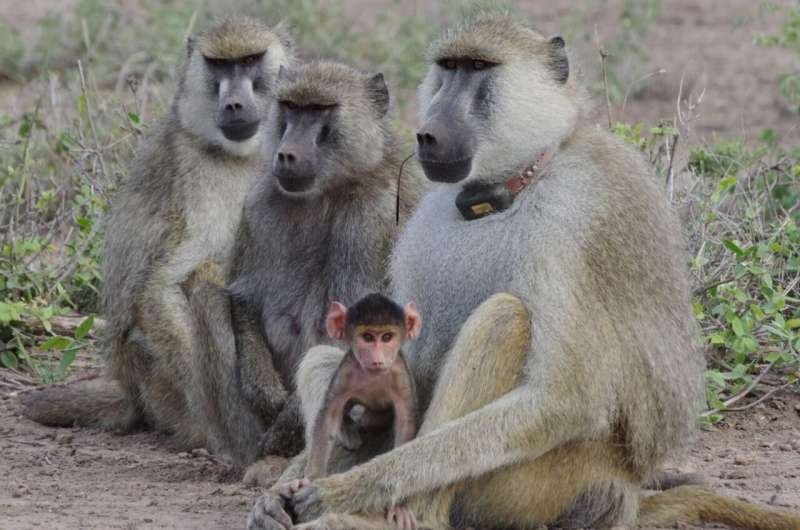In a groundbreaking study published on July 5, 2025, researchers from the University of Notre Dame have uncovered that strong father-daughter relationships can significantly impact the lifespan of female baboons. This research, published in the Proceedings of the Royal Society B, highlights the unexpected benefits of paternal involvement in a species where maternal care is traditionally predominant.
The study, led by Elizabeth Archie, a professor of biological sciences at Notre Dame, analyzed the social dynamics of 216 female baboons and their fathers in the Amboseli ecosystem of East Africa. The findings suggest that female baboons who maintain strong bonds with their fathers during early life tend to live two to four years longer than those with weaker paternal connections.
Unveiling the Role of Paternal Care
This development follows a broader interest in understanding the role of paternal care in mammals, a rarity outside of human societies. While baboon mothers provide all essential care, the study shows that fathers who choose to remain close to their daughters can have a profound impact on their offspring’s survival.
“Male baboons tend to reach their peak reproductive success when they’re young adults,” said Archie. “But once they’ve had a few kids and their condition declines, they sort of slide into ‘dad mode,’ where they don’t disperse as much and they don’t try as hard to mate. Then they have time to invest in and hang out with their kids.”
Key Findings and Methodology
The research team discovered that about one-third of the daughters lived in the same social group as their fathers for three years or more. The remaining two-thirds had fathers who either left the group or died within their daughter’s first three years of life.
Additionally, the study evaluated grooming habits between juvenile females and their fathers compared to other adult males. Grooming, a vital social activity akin to “the human equivalent of sitting down, having a cup of coffee and a good chat,” was found to strengthen the father-daughter bond.
“Early life adversity has a powerful effect on lifespan, so this study suggests that having a dad allows females that have experienced other forms of adversity to recover some of those costs,” Archie explained.
Implications for Evolutionary Biology
The implications of this study extend beyond baboons, offering insights into the evolutionary roots of human parental care. Despite the minimal contribution of mammal fathers to offspring care, this research underscores the significant impact of even minor paternal involvement.
Father-daughter pairs that co-resided for longer periods had stronger grooming relationships, which did not hold true for juvenile females and other adult males. This suggests that fathers play a unique role in their daughters’ social and physical well-being.
“Males seem to sort of expand a child’s social network, as they can be popular members of their social group,” Archie noted. “And dads can create a sort of safety zone for their daughters.”
Long-Term Research and Future Directions
This study is part of the Amboseli Baboon Research Project, one of the longest-running primate studies in the world, co-directed by Archie, Susan Alberts from Duke University, and Jenny Tung at the Max Planck Institute for Evolutionary Anthropology. The project has been pivotal in understanding primate behavior since its inception in 1971.
Co-authors of the study include David Jansen from the University of Wisconsin-Madison and J. Kinyua Warutere at the Amboseli National Park in Kenya. Their collaborative efforts continue to shed light on the complex social structures and survival strategies of baboons.
As researchers delve deeper into the nuances of paternal care in non-human species, this study opens new avenues for exploring the evolutionary benefits of fatherhood and its potential parallels in human societies.
 Father-Daughter Bonds Extend Lifespan in Female Baboons, Study Finds
Father-Daughter Bonds Extend Lifespan in Female Baboons, Study Finds Father-Daughter Bonds Extend Lifespan in Female Baboons, Study Finds
Father-Daughter Bonds Extend Lifespan in Female Baboons, Study Finds Father-Daughter Bonds Enhance Longevity in Female Baboons, Study Finds
Father-Daughter Bonds Enhance Longevity in Female Baboons, Study Finds Moon Phases Explained: What to Expect on July 6, 2025
Moon Phases Explained: What to Expect on July 6, 2025 Yulia Putintseva Requests Spectator Removal at Wimbledon Over Safety Concerns
Yulia Putintseva Requests Spectator Removal at Wimbledon Over Safety Concerns